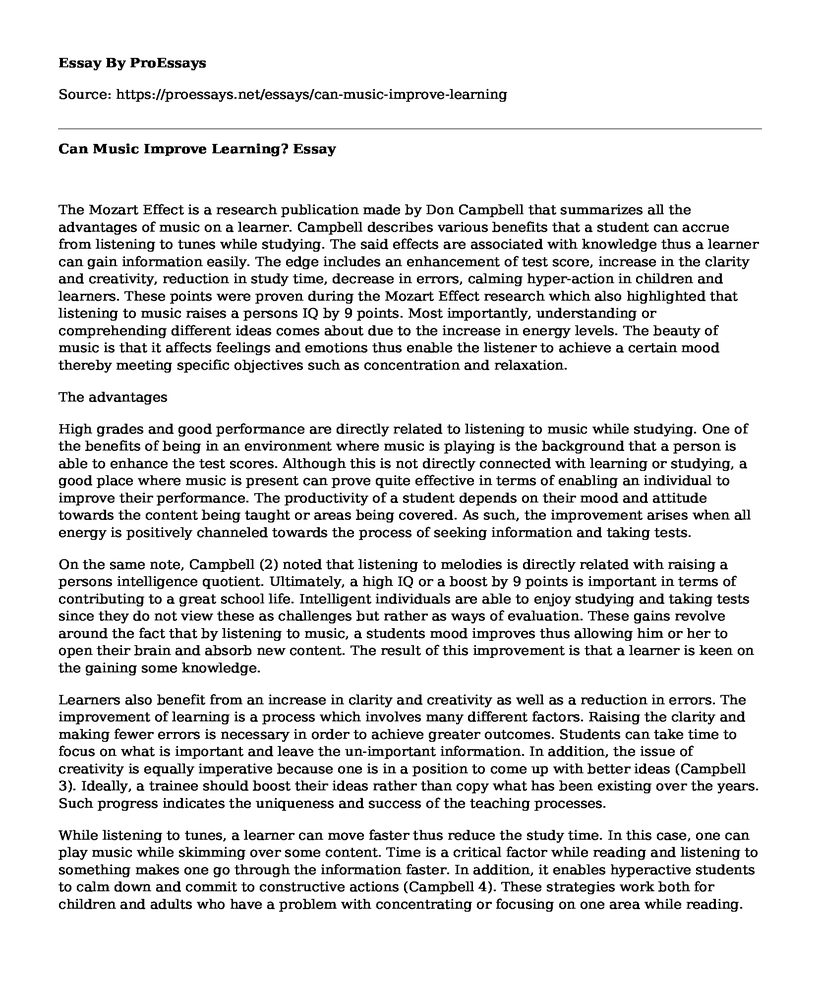The Mozart Effect is a research publication made by Don Campbell that summarizes all the advantages of music on a learner. Campbell describes various benefits that a student can accrue from listening to tunes while studying. The said effects are associated with knowledge thus a learner can gain information easily. The edge includes an enhancement of test score, increase in the clarity and creativity, reduction in study time, decrease in errors, calming hyper-action in children and learners. These points were proven during the Mozart Effect research which also highlighted that listening to music raises a persons IQ by 9 points. Most importantly, understanding or comprehending different ideas comes about due to the increase in energy levels. The beauty of music is that it affects feelings and emotions thus enable the listener to achieve a certain mood thereby meeting specific objectives such as concentration and relaxation.
The advantages
High grades and good performance are directly related to listening to music while studying. One of the benefits of being in an environment where music is playing is the background that a person is able to enhance the test scores. Although this is not directly connected with learning or studying, a good place where music is present can prove quite effective in terms of enabling an individual to improve their performance. The productivity of a student depends on their mood and attitude towards the content being taught or areas being covered. As such, the improvement arises when all energy is positively channeled towards the process of seeking information and taking tests.
On the same note, Campbell (2) noted that listening to melodies is directly related with raising a persons intelligence quotient. Ultimately, a high IQ or a boost by 9 points is important in terms of contributing to a great school life. Intelligent individuals are able to enjoy studying and taking tests since they do not view these as challenges but rather as ways of evaluation. These gains revolve around the fact that by listening to music, a students mood improves thus allowing him or her to open their brain and absorb new content. The result of this improvement is that a learner is keen on the gaining some knowledge.
Learners also benefit from an increase in clarity and creativity as well as a reduction in errors. The improvement of learning is a process which involves many different factors. Raising the clarity and making fewer errors is necessary in order to achieve greater outcomes. Students can take time to focus on what is important and leave the un-important information. In addition, the issue of creativity is equally imperative because one is in a position to come up with better ideas (Campbell 3). Ideally, a trainee should boost their ideas rather than copy what has been existing over the years. Such progress indicates the uniqueness and success of the teaching processes.
While listening to tunes, a learner can move faster thus reduce the study time. In this case, one can play music while skimming over some content. Time is a critical factor while reading and listening to something makes one go through the information faster. In addition, it enables hyperactive students to calm down and commit to constructive actions (Campbell 4). These strategies work both for children and adults who have a problem with concentrating or focusing on one area while reading.
The downside
The shortcomings that arise from listening to music while studying are that people need high-level concentration and focus thus it could be a distraction from the main goal. The objective of studying is to understand new concepts, refresh existing ideas and cover new material especially at an academic level. Therefore, having such a limitation would mean that tunes can divert an individuals attention and lead into lower performance rather than the expected improvement. The most imperative issue is to ensure that each learner understands his or her capability when it comes to the reading process in order to identify the right aspects to indulge in. As such, each learner should adopt various learning approaches in order to always improve the learning experiences.
Conclusion
The topic regarding whether listening to music or tunes can improve learning is one which can be argued from different positions. On the one hand, a learner or student boosts their intelligence quotient and calms the hyper-tension while on the other hand, one may be distracted and lose concentration. Clearly, the identified research findings on the Mozart Effect shows that learners stand to gain more than what stands to be lost. However, the shortcomings cannot be ignored since concentration and single-mindedness are key aspects that boost the process of gaining new information. Therefore, one should identify the right volume and type of music to listen to while learning rather in order to gain the benefits completely. Furthermore, using music while studying might not work well for all students thus individuals should search for alternatives where they can study within a conducive environment and improve their performance.
Work cited
Campbell, Don. "The Mozart Effect How Music Makes You Smarter | Howtolearn.Com". Howtolearn.com. N.p., 2016. Web. 27 Sept. 2016.
Cite this page
Can Music Improve Learning?. (2021, Mar 23). Retrieved from https://proessays.net/essays/can-music-improve-learning
If you are the original author of this essay and no longer wish to have it published on the ProEssays website, please click below to request its removal:
- Unforgettable Event that Has Happened in My Life
- Essay Sample on School Uniforms
- The Poem About the Accents in the Book "A Year in the Merde"
- New Insights Gained Based on Results of The "Locus of Control" Assessment
- The Red Pill Blues Concert by Maroon 5 Plan
- Gender Issues in Fine Arts and Fashion Design Essay
- Article Analysis Essay on 'Risky' Playgrounds Are Making a Comeback







